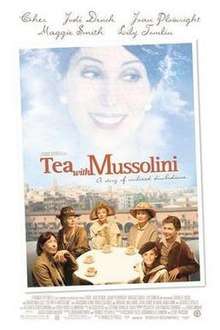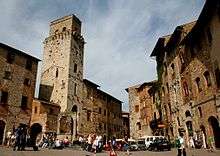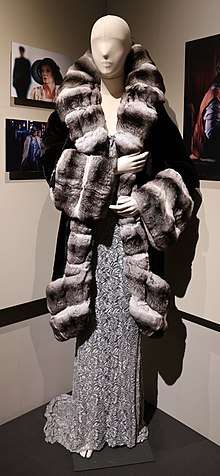Tea with Mussolini
Tea with Mussolini is a 1999 Anglo-Italian[1] semi-autobiographical film directed by Franco Zeffirelli,[2] scripted by John Mortimer, telling the story of a young Italian boy's upbringing by a circle of British and American women before and during the Second World War.[2]
| Tea with Mussolini | |
|---|---|
 Theatrical release poster | |
| Directed by | Franco Zeffirelli |
| Produced by | Clive Parsons Riccardo Tozzi Giovannella Zannoni Frederick Muller Marco Chimenz Pippo Pisciotto |
| Screenplay by | John Mortimer |
| Story by | Franco Zeffirelli (autobiography) |
| Starring |
|
| Music by | Stefano Arnaldi Alessio Vlad |
| Cinematography | David Watkin |
| Edited by | Tariq Anwar |
Production company | Cattleya Cineritmo Medusa Film Film and General Productions |
| Distributed by | Medusa Film (Italy) United International Pictures (United Kingdom) |
Release date | 26 March 1999 (Italy) 2 April 1999 (UK) |
Running time | 117 minutes |
| Country | United Kingdom Italy |
| Language | English Italian |
| Budget | $12 million |
| Box office | $45,566,200 (US only) |
Plot
The film begins in 1935 in Florence, Italy, where a group of cultured expatriate English women – called the "Scorpioni" by the Italians – meet for tea every afternoon. Young Luca (Charlie Lucas) is the illegitimate son of an Italian businessman (Massimo Ghini) who shows little interest in his son's upbringing; the boy's mother, a dressmaker, has recently died. Mary Wallace (Joan Plowright), who works as the man's secretary, steps in to care for him, turning for support to her Scorpioni friends, including eccentric would-be artist Arabella (Judi Dench). Together, they teach Luca many lessons about life and especially the arts. Elsa Morganthal (Cher), a brash rich young American widow whom Scorpioni matron Lady Hester Random (Maggie Smith) barely tolerates, sets up a financial trust for Luca when she learns of the death of his mother, whom she was fond of and to whom Elsa still owes money for her dressmaking services.
One day when the ladies are in a restaurant for afternoon tea, it is vandalised by Fascists, reflecting the increasingly uncertain position of the expatriate community. Lady Hester, widow of Britain's former ambassador to Italy, retains an admiring faith in Benito Mussolini (Claudio Spadaro) and takes it upon herself to visit him, receiving his insincere assurances of their safety, and proudly recounts her "tea with Mussolini". But the political situation continues to deteriorate and the Scorpioni find their status and liberties diminishing. Luca's father decides that Italy's future is with Germany rather than Britain and sends Luca to an Austrian boarding school.
Five years later, Luca (now played by Baird Wallace) returns to Florence with the intention of using Elsa's trust fund to study art. He finds that most British nationals are fleeing the country, anticipating Mussolini's declaration of war on Great Britain, and that Mary has moved in with Lady Hester and the other English hold-outs. He arrives at the house just as they – and Hester's ineffectual grandson Wilfred (Paul Chequer), disguised as a young woman for his safety – are being rounded up and put onto a transport truck, which he follows to the nearby Tuscan town of San Gimignano. Because the United States is not at war, Elsa and her American compatriot Georgie Rockwell (Lily Tomlin), an openly lesbian archaeologist, remain free. Elsa uses Luca to deliver forged orders and funds to have the ladies moved from their distressingly barracks-like quarters to an upper class hotel. Believing that Mussolini himself issued the orders, Lady Hester is delighted, proudly brandishing the newspaper photo of her tea with Il Duce.

As the war progresses, oppression of Jews increases and Jewish Elsa – protected somewhat by her citizenship and wealth – provides a group of Italian Jews with fake passports, enlisting Luca – who has become enamored of her – to deliver them. However Luca becomes jealous when she forms a romantic alliance with Vittorio (Paolo Seganti), a shrewd Italian lawyer.
When the United States enters the war in 1941, Elsa and Georgie are interned with the British women. Elsa falls for Vittorio's scheme to embezzle her art collection and money, which would deliver her to the German Gestapo in a phony escape to Switzerland. Luca is aware of the deception but does not tell anyone out of jealous spite against Elsa. Mary learns of it from Elsa's art dealer, (Mino Bellei), and scolds Luca. His attitude changes and he gives his trust fund money to members of the Italian resistance movement, which Wilfred has joined. Elsa still refuses to believe Vittorio's betrayal and is ultimately convinced only when Lady Hester, informed by Mary and Luca of what Elsa has secretly done for all of them, repents of her contempt for Elsa and offers her gratitude and help. Elsa consents to an escape plan hatched by Mary, Luca and Wilfred. Before she departs, Elsa tells Luca how she once helped his young mother choose to go through with her pregnancy, thus allowing him to be there for her.
In July 1944, as the British Army advances toward San Gimignano, Arabella frantically defends her beloved frescoes from demolition by German troops and is heroically joined in the line of fire by Georgie and the English women, including Lady Hester. They are saved when the Germans receive orders to retreat, leaving the women and the towers untouched. The city rejoices as the Scots arrive, with Luca now serving as their commander's Italian interpreter. The major has orders to evacuate the Scorpioni but Lady Hester refuses to cooperate, resolved that they will resume their former lives in Italy. Mary is delighted to see that Luca – now in British uniform – has become the "English gentleman" his father wished him to become.
Closing texts explain the mostly happy fates of the characters, concluding with the remark that Luca went on to become an artist and "helped in making this film" – in other words, as writer and director.
Cast

- Dame Joan Plowright as Mary Wallace, a British expatriate who becomes a surrogate mother for Luca
- Dame Maggie Smith as Lady Hester Random, widow of the former British ambassador to Italy
- Cher as Elsa Morganthal Strauss-Armistan, a wealthy American socialite
- Dame Judi Dench as Arabella, an aspiring artist and art lover
- Lily Tomlin as Georgina 'Georgie' Rockwell, an openly lesbian American archaeologist
- Tessa Pritchard as Connie Raynor, a journalist for The Morning Post
- Baird Wallace as Luca Innocente, as a teenager
- Charlie Lucas as Luca Innocente, as a child
- Paul Chequer as Wilfred 'Lucy' Random, Lady Hester's grandson
- Paolo Seganti as Vittorio Fanfanni, a lawyer and Elsa's lover
- Mino Bellei as Cesare, an art dealer and close friend of Elsa
- Massimo Ghini as Paolo Guarnieri Innocente, Luca's father
- Michael Williams as the British Consul
- Claudio Spadaro as Benito Mussolini
- Pino Colizzi as Dino Grandi
Michael Williams, who was married to Judi Dench in real life, died not long after the film was finished. This film marks his last on-screen appearance.
Production
Lady Hester Random is based upon a real resident of Florence whom Zeffirelli knew in his childhood. Zeffirelli mentions her and a couple of other ladies of the Scorpioni in his autobiography. He said: "I don't remember if she was called Hester, but I remember this terrible, fantastic woman. She was the dowager of the community. I remember the many outrageous things she did because she could afford to be arrogant and bossy."
Reception
The film opened tenth at the U.S. box office with $1,633,183 for the weekend, eventually grossing a total of $45,566,200, considerably more than its budget.
Awards and nominations
- Won
- 2000 – BAFTA Awards – Best Performance by an Actress in a Supporting Role; Maggie Smith.
- 2000 – Hollywood Makeup Artist and Hair Stylist Guild Awards – Best Period Hair Styling Feature; Vivian McAteer.
- 2000 – Italian National Syndicate of Film Journalists – Best Costume Design (Migliori Costumi); Anna Anni, Alberto Spiazzi.
- Nominations
- 1999 – Golden Trailer Awards – Best Drama.
- 2000 – BAFTA Awards – Best Costume Design; Jenny Beavan, Anna Anni, Alberto Spiazzi.[3]
See also
Footnotes
- The film was produced by three Italian companies (Medusa Produzione, Cattleya and Cineritmo) and one British ( Film and General Productions Ltd)
- Franco Zeffirelli Filmography
- "Tea with Mussolini". IMDb.com. Retrieved 2015-10-19.
External links
- Tea with Mussolini on IMDb
- Tea with Mussolini at Box Office Mojo
- Tea with Mussolini at Rotten Tomatoes
- Tea with Mussolini filming locations at Movieloci.com